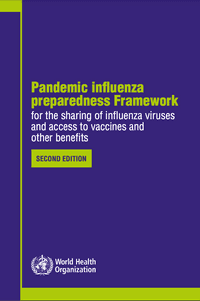Pandemic Influenza Preparedness (PIP) Framework for the Sharing of Influenza Viruses and Access to Vaccines and Other Benefits
[WHO PIP Framework]
The PIP framework is designed to improve pandemic influenza preparedness and response and to strengthen the WHO global influenza surveillance and response system. This framework establishes a system for the sharing of H5N1 and other potentially high-consequence influenza viruses as well as the sharing of benefits, such as vaccines.
SUMMARY
The WHO Pandemic Influenza Preparedness (PIP) framework establishes a system for the sharing of viruses with pandemic potential as well as for vaccines and other life-saving products during a pandemic. The framework was introduced after the 2009 H1N1 pandemic illustrated the need for the sharing of vaccines, antivirals, and other pandemic response supplies between Member states. It aims to strengthen the WHO global surveillance and response system (“WHO GISRIS”).
WHO GISRIS acts as a global alert system for the emergence of influenza viruses with certain notable features, particularly pandemic potential. The system encompasses four types of institutions and laboratories: National Influenza Centres, WHO Collaborating Centres, WHO H5 Reference Laboratories, and Essential Regulatory Laboratories. All of those institutions are subject to certain guiding principles, which are included within this document.
The framework also includes a standard material transfer agreement that may be used whenever “PIP biological materials” are shared between laboratories. PIP biological materials include human clinical specimens, as well as virus isolates of, modified viruses prepared from, cDNA encompassing the coding region of, and RNA extracted from H5N1 and other influenza viruses with human pandemic potential. This agreement can help laboratory managers coordinate the safe sharing of biological materials. The outline of the PIP benefits sharing system will also help legislative leaders in Member States ensure their role in the sharing and receiving of materials to prepare for the next pandemic.


..png)
